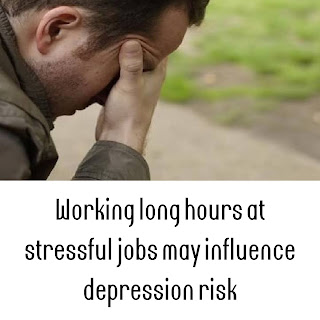- Working long hours at stressful jobs is associated with an increased risk of developing depression, new research suggests. Depressive symptom scores changed by a factor of three.
- Even people who work long hours at stressful jobs can take some steps to protect their mental health.
A recent study by a team from the University of Michigan, published this month in the New England Journal of Medicine, found that the longer a week worked at a stressful job, the higher the risk of depression. Researchers examined data from more than 17,000 first-year medical professionals who had completed 11 years of training in hospitals across the United States. They found that people working 90 or more hours a week had three times more symptoms of depression than those working 40 to 45 hours a week.
The study found an average 1.8 point increase in symptoms on the standard scale for those working 40 to 45 hours, compared to 5.2 points for residents working 90 or more hours. At the beginning of her first year of residency, only 1 of her 20 met the criteria for moderate to severe depression.
The study also found that a higher proportion of the group working longer hours were more likely to score high enough to qualify for the diagnosis of moderate-to-severe depression compared to the group working fewer hours. I was. The resident reported that he worked 80 hours a week, an average of 65 hours.
This study sheds light on the link between mental health problems and long working hours at stressful jobs. Trying to find a way to deal with the rate of increase...workers.
Research has revealed that the average weekly working hours for residents need to be further reduced.
Research has revealed that the average weekly working hours for residents need to be further reduced.
Why are more hours worked equated with increased rates of depression and more severe depression?
The study strongly suggests that reducing working hours reduces the number of residents who develop diagnosable depression.
Tess Brigham, MFT, BCC, life coach and family therapist from San Francisco, CA, believes it's because "work is stressful and constant stress on the body affects it in many ways." .
She says, "The amount of time for self-care is not the same," says Dr. Jennifer Kroll, a licensed psychologist based in Quakertown, Pennsylvania. I don't have much time."
Tess Brigham, MFT, BCC, life coach and family therapist from San Francisco, CA, believes it's because "work is stressful and constant stress on the body affects it in many ways." .
She says, "The amount of time for self-care is not the same," says Dr. Jennifer Kroll, a licensed psychologist based in Quakertown, Pennsylvania. I don't have much time."
Hours worked and depression
Although the study involved first-year residents, the study authors found similar adverse mental health effects when similar studies were conducted in other high-stress, long-hour jobs.
Brigham thinks the number of hours worked is more likely to be responsible for the increased risk of depression than the stressful nature of the job.
Brigham thinks the number of hours worked is more likely to be responsible for the increased risk of depression than the stressful nature of the job.
she said: There was a reason we went from 6 days a week to 5 days a week. Because even the best employees eventually lose focus and power after reaching a certain number of hours. No matter how comfortable your job is, if you're stuck behind your desk away from the people you love, it can be depressing. ”
Krall agrees. "You need time to take care of yourself and do something to lower your cortisol levels and raise your serotonin levels. Your body needs these things to stay healthy and healthy." If you spend most of your time working, you don't have time for that."
How can a person manage their stress when they work a lot of hours?
Large organizations are still considering ways to address the rising rate of depression among health care workers, but anyone with a stressful job that involves long hours is working on better mental health. can do.
Cralls said: You may not be able to take breaks and rest, but you can learn to set mental boundaries and keep working.
she continues. Let her build a wall to not take her job personally, leave that stress behind and quit her job. "
she continues. Let her build a wall to not take her job personally, leave that stress behind and quit her job. "
This helps create a balance of sorts when it seems out of balance based on the number of hours spent on the job. said to Stop thinking of yourself as a machine and start seeing yourself as a human being, realizing that you have human needs like rest, play, and sunlight. ”
To do this, "I need to change some mindsets at work and stop feeling like I have to say 'yes' to everything.
Brigham continues. Time to recharge, learn how to incorporate these techniques into your life, and get back to work. It's really hard to make these changes on the fly when you're already burned out. ”
Brigham continues. Time to recharge, learn how to incorporate these techniques into your life, and get back to work. It's really hard to make these changes on the fly when you're already burned out. ”
Active Kids Are Better at Coping with Stress
Researchers looked at the daily physical activity levels of hundreds of 8-year-olds and found that even the happiest children are the most active.
Children who exercise regularly are better able to cope with stress, a new study finds.
Scientists from the University of Helsinki, Finland, have first studied the relationship between a child's physical activity and her hormonal response to stress.
To do this, they used accelerometers, pedometer-like devices that measure a person's movements, to study the daily activity levels of 252 of her 8-year-olds. They also took saliva samples to check levels of cortisol, a hormone released when the body is under stress.
The children were then given tasks such as math problems and speaking in front of others. Afterwards, their stress hormone levels were tested again.
“The results suggest that physical activity improves mental health by protecting children from the effects of everyday stressors, such as public speaking.”
Martikainen's study was published in the Endocrine Society's Journal of Clinical Endocrinology & Metabolism (JCEM). It was published.
Children who exercise regularly are better able to cope with stress, a new study finds.
Scientists from the University of Helsinki, Finland, have first studied the relationship between a child's physical activity and her hormonal response to stress.
To do this, they used accelerometers, pedometer-like devices that measure a person's movements, to study the daily activity levels of 252 of her 8-year-olds. They also took saliva samples to check levels of cortisol, a hormone released when the body is under stress.
The children were then given tasks such as math problems and speaking in front of others. Afterwards, their stress hormone levels were tested again.
“The results suggest that physical activity improves mental health by protecting children from the effects of everyday stressors, such as public speaking.”
Martikainen's study was published in the Endocrine Society's Journal of Clinical Endocrinology & Metabolism (JCEM). It was published.
How Exercise Helps Our Brains
Researchers have linked physical activity to lower stress levels, but it is not yet known which mechanisms in the brain trigger these changes. could be the key to developing new drugs.
Pediatric endocrinologist Henry Anhalt, DO, chair of the Endocrine Society's Advocacy and Public Outreach Core Committee, says the Finnish study has only scratched the surface of how exercise affects our mental health.
Anhalt called the study "an important finding," but to clarify why we feel better after exercise and how we can discover biological differences before and after exercise,
"That's the million-dollar question," Anhalt said in an interview with Healthline. "One of the things that we as parents can learn from [the research] is that exercise is good. We know exercise is good for the body and the mind."
Pediatric endocrinologist Henry Anhalt, DO, chair of the Endocrine Society's Advocacy and Public Outreach Core Committee, says the Finnish study has only scratched the surface of how exercise affects our mental health.
Anhalt called the study "an important finding," but to clarify why we feel better after exercise and how we can discover biological differences before and after exercise,
"That's the million-dollar question," Anhalt said in an interview with Healthline. "One of the things that we as parents can learn from [the research] is that exercise is good. We know exercise is good for the body and the mind."
The Importance of Exercise and the Dangers of Stress in Children
This study further proves the importance of teaching children positive and positive behavior.
Previous studies on childhood stress have found that environmental factors, including stress, can affect the physical makeup of the brain and cause mental illness in genetically predisposed individuals.
In addition to the mental benefits of regular activity, the physical benefits of exercise range from reducing the risk of chronic diseases to improving academic performance.
Conversely, childhood obesity is associated with improved school retention, depression, and allergies.
We may not know exactly why exercise makes us feel better, but we know it does. If your child is a little stressed or acting grumpy, take him outside and run around. It's good for both of you.
Previous studies on childhood stress have found that environmental factors, including stress, can affect the physical makeup of the brain and cause mental illness in genetically predisposed individuals.
In addition to the mental benefits of regular activity, the physical benefits of exercise range from reducing the risk of chronic diseases to improving academic performance.
Conversely, childhood obesity is associated with improved school retention, depression, and allergies.
We may not know exactly why exercise makes us feel better, but we know it does. If your child is a little stressed or acting grumpy, take him outside and run around. It's good for both of you.








0 Comments